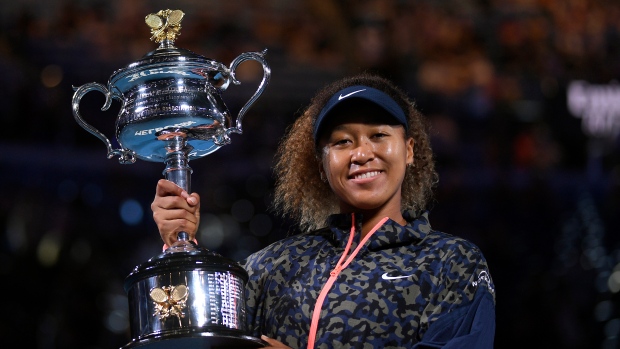Feb 20, 2021
Osaka wins Australian Open, 4th Grand Slam
Naomi Osaka won her fourth title in her past eight appearances at a Slam, emerging from what initially was a tight Australian Open final and pulling away by grabbing six consecutive games to beat Jennifer Brady 6-4, 6-3 on Saturday.
The Canadian Press

MELBOURNE, Australia — As Naomi Osaka strode through the Champion's Walk leading to the court for the Australian Open final — headphones on her ears, racket bag strapped to her back — she reached out her left hand to tap a panel marked with her name and the year of her previous title there.
Not a big deal, she explained. Just a bit of superstition. Less than 10 minutes later, she began the match against Jennifer Brady. And less than 1 1/2 hours later, Osaka won the last point, because that's what she does when the stakes are the greatest on her sport's biggest stages.
Osaka improved to 4-0 in Grand Slam finals by grabbing six consecutive games to pull away in what initially was a tight contest, beating Brady 6-4, 6-3 at Melbourne Park on Saturday.
“You don’t go into a final wanting to be the runner-up. For me, I feel like every opportunity that I play a Slam is an opportunity to win a Slam,” said the 23-year-old Osaka, who will move up to No. 2 in the WTA rankings. “So I think maybe I put that pressure on myself too much, but honestly, it’s working out in my favour right now."
Sure is.
With serves that reached 122 mph (197 kph) and produced six aces, and returns that helped create six breaks, Osaka became the first woman to win her first four major finals since Monica Seles did it 30 years ago.
That is part of Osaka's 12-0 record in quarterfinals, semifinals and finals at the majors.
“She plays so aggressive that she puts so much pressure on you to perform well,” said Brady, a 25-year-old from Pennsylvania who played college tennis at UCLA and was participating in a Slam final for the first time. "And that’s something that not every tennis player has that ability to do.”
Osaka, the 2020 AP Female Athlete of the Year, is also on a 21-match winning streak that dates to last season and includes her championship at last year’s U.S. Open. She also won the U.S. Open in 2018, and the Australian Open in 2019.
“What I have learned on and off the court is it’s OK to not be sure about yourself. For me, I feel like I’ve always forced myself to, like, be ‘strong’ or whatever. I think if you’re not feeling OK, it’s OK to not feel OK,” Osaka said. “But you have to sort of go within yourself and figure things out in a way.”
Osaka was born in Japan to a Japanese mother and Haitian father, and moved to the United States with her family when she was 3. She has been a vocal advocate for Black victims of racism and police violence, saying she would refuse to play a match at one tournament last year to spotlight the issue.
“She’s such an inspiration to us all, and what she’s doing for the game is amazing in getting the sport out there,” said Brady, who was seeded 22nd. “I hope young girls at home are watching and inspired by what she’s doing.”
Brady had to go through a hard quarantine for 15 days when she arrived in Australia in January because someone on her flight tested positive for COVID-19 when they arrived.
Playing Osaka represented a big step up in competition during this tournament for Brady, who had not faced anyone ranked in the Top 25 nor anyone who previously appeared in so much as one Grand Slam semifinal.
Brady's only previous final four appearance at a major came at the U.S. Open in September, when she lost to Osaka in three sets.
She wasn't able to push the champ as much this time on an evening that was breezy and cooler than it's been lately, with the temperature below 70 degrees Fahrenheit (20 degrees Celsius).
The attendance was announced at 7,381; spectators were allowed back after being barred earlier in the tournament during a COVID-19 lockdown.
“I didn’t play my last Grand Slam with fans," Osaka said, "so just to have this energy, it really means a lot.”
The final turned at 4-all, when Brady used an on-the-run lob winner that she punctuated by waving her arms to request more noise from the crowd. That earned a break point — convert that, and she would serve for the opening set.
But Osaka erased the chance with a cross-court forehand winner, and two errors by Brady made it 5-4. Osaka then broke to grab the set, helped by Brady’s double-fault and a netted forehand on a short ball to end it.
“Happens maybe one in 10 times,” Brady said of that mistake, “or hopefully less.”
That was part of the run that put Osaka ahead 4-0 in the second set and she was on her way.
Now only two active women own more major trophies: Serena Williams, with 23, and her sister, Venus, with seven.
Osaka beat Serena Williams — a player she calls her idol — in the semifinals Thursday.
And as much as Osaka makes plain that she wants to keep adding to her Grand Slam collection, there are larger goals, too.
“This is going to sound really odd, but hopefully I play long enough to play a girl that said that I was once her favourite player or something,” said Osaka, who signed autographs for fans after her victory. “For me, I think that’s the coolest thing that could ever happen to me. ... That's how the sport moves forward.”
___
More AP tennis: https://apnews.com/hub/tennis and https://twitter.com/AP_Sports
